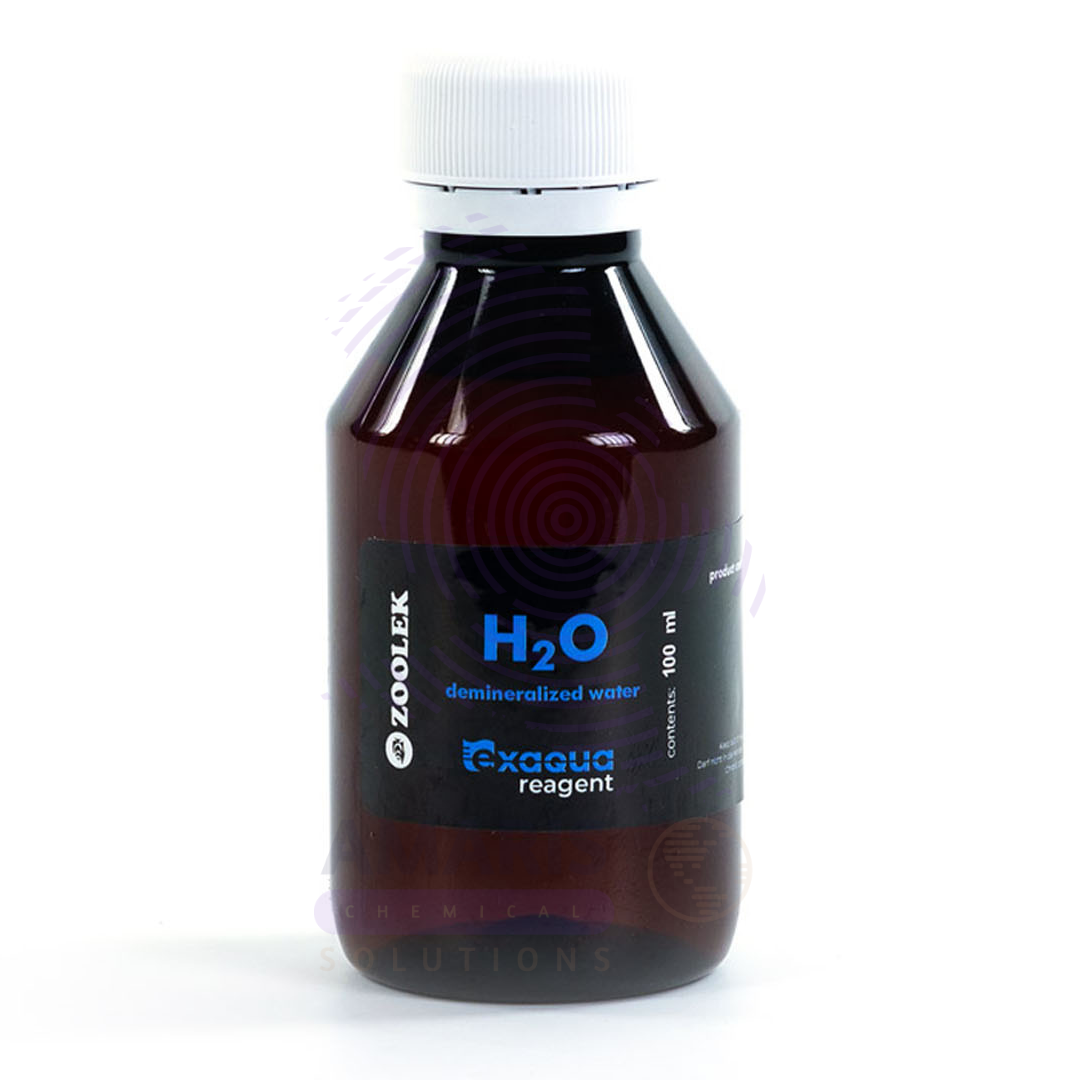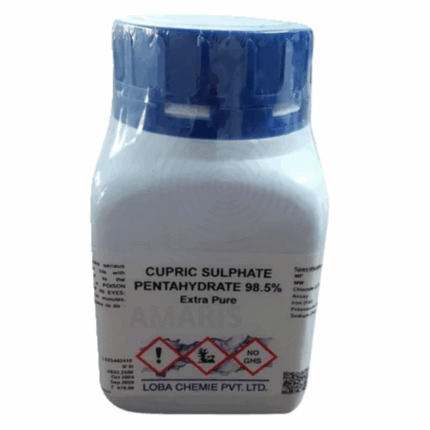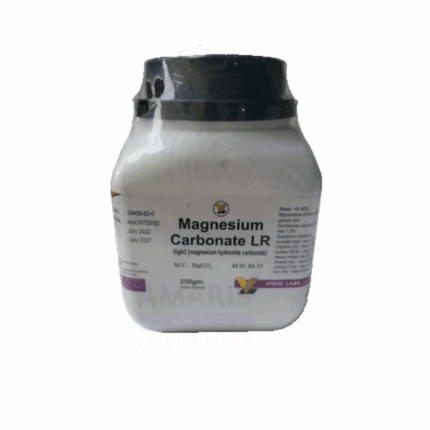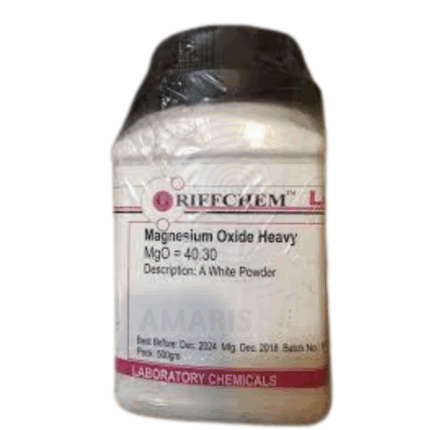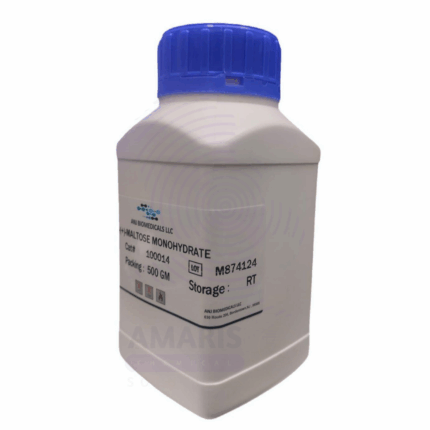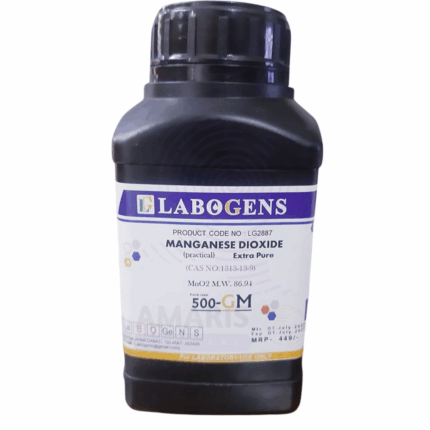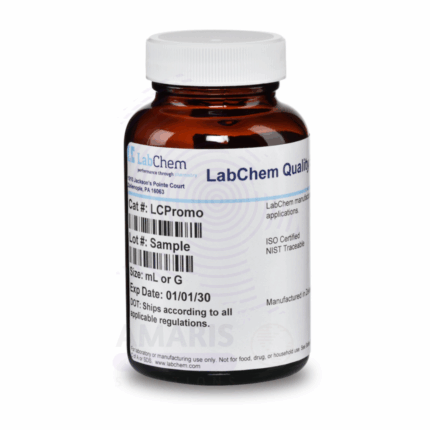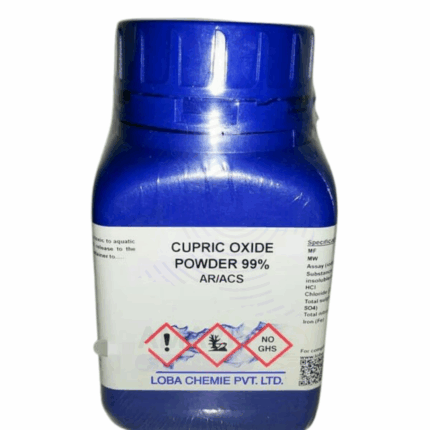
Cupric Oxide Extra Pure
$ 22.30 Original price was: $ 22.30.$ 22.10Current price is: $ 22.10.
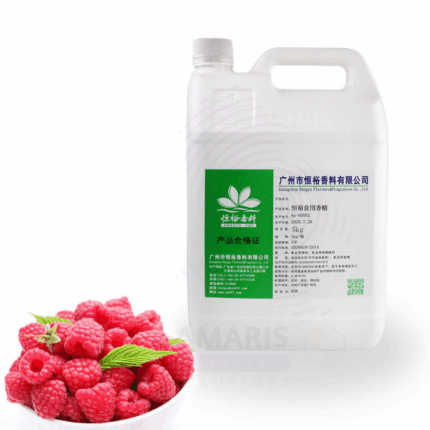
Raspberry Liquid Flavour Food Grade
$ 39.00 Original price was: $ 39.00.$ 38.67Current price is: $ 38.67.
Deionized Water Extra Pure
$ 6.70 Original price was: $ 6.70.$ 6.59Current price is: $ 6.59.
Whatsapp Order
Deionized Water Extra Pure is ultra-purified water that has had all mineral ions, such as sodium, calcium, iron, chloride, and sulfate, removed through ion-exchange processes. It is widely used in laboratories as a solvent, reagent diluent, and cleaning agent for sensitive instruments, ensuring no interference from dissolved ions in chemical analyses or reactions. This extra pure grade guarantees extremely low conductivity and minimal contaminants, making it ideal for analytical procedures, biological experiments, and preparation of standard solutions. It should be stored in clean, non-leaching containers to maintain its purity and prevent recontamination.
Description
Table of Contents
Toggle
Deionized Water Extra Pure
Primary Uses
- Solvent for Sensitive Reactions
- Ideal for reactions that require minimal ionic contamination, especially those involving precipitation, titration, or synthesis.
- Solution & Reagent Preparation
- Used to prepare accurate concentrations of analytical reagents, standards, and buffers due to its high purity and predictable conductivity.
- Glassware Rinsing & Cleaning
- Final rinse water in analytical labs to prevent ion residues from tap water that could interfere with measurements.
- Instrument Feed Water
- Essential in AAS, HPLC, GC-MS, ICP, and spectrophotometers to avoid signal interference and clogging due to dissolved salts.
Secondary Uses
- Microbiology & Cell Culture Media
- Used in combination with sterile techniques to avoid contamination with metal ions or chlorine that affect microbial growth.
- Battery Electrolyte & Calibration
- Acts as a base for electrolyte preparation or calibration of pH meters and conductivity probes.
- Photographic & Optical Work
- Prevents mineral deposits on lenses, films, or sensitive optical instruments.
Additional information
| PACK SIZE |
20ltrs |
|---|
KEY PRODUCT FEATURES
1. Basic Identification Attributes
- Chemical Name: Deionized Water
- Common Name: DI Water / Demineralized Water
- CAS Number: 7732-18-5
- Chemical Formula: H₂O
- Grade: Extra Pure (Laboratory Grade, free from ionic contaminants)
2. Physical & Chemical Properties
- Appearance: Clear, colorless, odorless liquid
- Solubility: Completely miscible with most solvents
- pH: Typically between 5.5 – 7.5 (due to CO₂ absorption)
- Conductivity: <1 µS/cm (ultrapure), depending on production quality
- Boiling Point: 100 °C
- Freezing Point: 0 °C
- Density: 1.000 g/cm³ at 4 °C
3. Safety & Hazard Attributes
- GHS Classification: Not classified as hazardous
- NFPA Ratings:
- Health: 0
- Flammability: 0
- Reactivity: 0
- First Aid Measures:
- Inhalation / Skin / Eye / Ingestion: No adverse effects under normal conditions
4. Storage & Handling Attributes
- Storage Conditions:
- Store in tightly sealed containers
- Avoid contamination—use clean, inert, or sterilized containers
- Best stored in glass or high-grade plastic containers (e.g., HDPE, PP, PTFE)
- Handling Advice:
- Avoid contact with reactive chemicals that could leach into water
- Prevent exposure to air if CO₂-sensitive applications require ultra-low conductivity
5. Regulatory & Compliance Attributes
- EINECS Number: 231-791-2
- UN Number: Not regulated
- REACH Status: Exempt (naturally occurring substance)
6. Applications in Laboratory
- Primary Use:
- Essential solvent and diluent in most analytical and preparative procedures
- Other Uses:
- Preparation of standards, reagents, buffers, and media
- Rinsing and cleaning of glassware to avoid contamination
- Feedwater for laboratory instruments (HPLC, AAS, ICP-MS, etc.)
- Electrochemistry and pH measurements
- Molecular biology and microbiology applications
- Cooling and autoclaving processes
SAFETY HANDLING PRECAUTIONS
SAFETY PRECAUTIONS
- PPE: Typically minimal, but for sensitive labs:
- Gloves (to prevent contamination)
- Clean lab attire
- Use clean, sterile containers to avoid recontamination
- Handling Notes:
- Use only with dedicated containers to avoid ionic leaching or contamination
- Do not expose to air for extended periods—can absorb CO₂, affecting pH
- Storage Conditions:
- Store in high-density polyethylene (HDPE) or borosilicate glass
- Keep tightly sealed in a clean, dry environment
- Protect from dust and environmental contaminants
FIRST AID MEASURES
- Generally non-toxic and safe
- In case of accidental contamination with lab substances, treat based on the contaminant involved
FIREFIGHTING MEASURES
- Flammability: Non-flammable
- Fire hazard: None
Related products
Cupric Oxide Extra Pure
Cupric Oxide Extra Pure is a black, fine powder extensively used in laboratory settings as a stable, high-purity source of copper in oxidation state +2. It is commonly applied in organic synthesis, inorganic reactions, and thermal decomposition studies, as well as in qualitative and quantitative analysis of copper. Its thermal stability also makes it suitable for ceramic glazing and as a precursor in catalyst preparation. This extra pure grade ensures low impurity levels, essential for accurate experimental results and reproducible data in both educational and research laboratories. It should be stored in a tightly sealed container away from moisture and strong acids.
Cupric Sulphate Pentahydrate Extra Pure
Cupric Sulphate Pentahydrate Extra Pure is a vibrant blue crystalline compound widely used in laboratories for its high solubility and consistent copper ion content. It is essential in analytical chemistry for Fehling's and Benedict’s solutions, in electrochemistry for plating and battery experiments, and as a biological nutrient in microbiological media. The pentahydrate form offers ease of handling and precise formulation in aqueous solutions. This extra pure grade ensures exceptional purity, making it suitable for teaching labs, research applications, and controlled experimental procedures. Store in a sealed container away from heat and moisture to maintain its crystalline integrity.
Magnesium Carbonate Extra Pure
Magnesium Carbonate Extra Pure is a high-purity, white powder valued for its excellent absorbent and antacid qualities. It is commonly used in pharmaceuticals as a magnesium supplement or antacid, and in food applications as a drying agent, anti-caking agent, or acidity regulator. In the cosmetics and personal care industry, it functions as a filler and a bulking agent in powders and creams. It is also employed in laboratory settings for analytical applications due to its consistent chemical composition. Its high absorbency and stability make it useful in rubber, ceramics, and sports grip products as well.
Magnesium Oxide Heavy Extra Pure
Magnesium Oxide Heavy Extra Pure is a high-purity, dense white powder prized for its excellent thermal stability, high melting point, and chemical inertness. It is widely used in laboratory applications as a standard reagent, pH adjuster, and desiccant. In pharmaceuticals, it functions as an antacid and a magnesium supplement, while in industrial processes, it is essential for producing refractory materials, ceramics, and insulating products due to its high heat resistance. The "heavy" form refers to its higher bulk density, making it particularly useful in applications where volume constraints are critical. Its extra pure grade ensures it meets the stringent demands of high-precision research and formulation work.
Maltose Extra Pure
Maltose Extra Pure is a disaccharide composed of two glucose units, commonly known as malt sugar. This extra pure grade ensures exceptional quality and consistency, making it ideal for use in biochemical research, fermentation studies, and laboratory analysis. In the food industry, maltose is valued for its mild sweetness and is often used in brewing, baking, and confectionery to promote fermentation and enhance flavor. It also plays a role in energy metabolism studies and is frequently used as a carbon source in microbiological media. Its stability and solubility in water make it easy to incorporate into various formulations, offering a dependable ingredient for scientific and industrial use where high purity is essential.
Manganese Dioxide Extra Pure
Manganese Dioxide Extra Pure is a high-purity, dark brown or black powder widely used in laboratories and industrial processes for its strong oxidizing properties. In analytical chemistry, it serves as an effective oxidizing agent and is often involved in the decomposition of hydrogen peroxide and other redox reactions. It is also used in the preparation of oxygen and chlorine gases in laboratory settings. Beyond the lab, manganese dioxide plays a crucial role in battery manufacturing, particularly in dry cell batteries, and in ceramics and glass production for coloring and decolorizing. Its consistent purity makes it ideal for sensitive experiments and formulations.
Methoxy Benzophenone Sulfonic Acid Extra Pure
Methoxy Benzophenone Sulfonic Acid Extra Pure is a high-purity, water-soluble organic compound primarily used as a UV filter in cosmetic and pharmaceutical formulations. This compound is valued for its ability to absorb harmful ultraviolet radiation, particularly in the UVB range, making it a key ingredient in sunscreens, lotions, and other personal care products requiring photo-stability. In laboratory settings, it is employed in research involving photochemistry and polymer stabilization. Its sulfonic acid group enhances water solubility, while the methoxy and benzophenone components provide strong UV-absorbing characteristics, ensuring effective and consistent performance in formulations demanding high safety and efficacy standards.
Methyl Orange Disodium Salt Extra Pure
Methyl Orange Disodium Salt Extra Pure is a high-purity pH indicator commonly used in titrations and analytical chemistry to determine acidity levels. It exhibits a sharp color change from red in acidic environments to yellow in alkaline conditions, typically within the pH range of 3.1 to 4.4. This disodium salt form ensures excellent solubility in water, making it especially reliable for use in aqueous solutions. Its stability and sensitivity make it ideal for laboratory applications involving strong acid–base reactions, particularly in titrations of mineral acids. Methyl Orange Disodium Salt Extra Pure is a trusted choice for consistent and accurate results in both educational and professional lab settings.


 Preservatives(food)
Preservatives(food) Flavor Enhancers
Flavor Enhancers Acidulants
Acidulants Sweeteners
Sweeteners Antioxidants
Antioxidants Colorants(food)
Colorants(food) Nutraceutical Ingredients (food)
Nutraceutical Ingredients (food) Nutrient Supplements
Nutrient Supplements Emulsifiers
Emulsifiers
 Collectors
Collectors Dust Suppressants
Dust Suppressants Explosives and Blasting Agents
Explosives and Blasting Agents Flocculants and Coagulants
Flocculants and Coagulants Frothers
Frothers Leaching Agents
Leaching Agents pH Modifiers
pH Modifiers Precious Metal Extraction Agents
Precious Metal Extraction Agents
 Antioxidants(plastic)
Antioxidants(plastic) Colorants (Pigments, Dyes)
Colorants (Pigments, Dyes) Fillers and Reinforcements
Fillers and Reinforcements Flame Retardants
Flame Retardants Monomers
Monomers Plasticizers
Plasticizers Polymerization Initiators
Polymerization Initiators Stabilizers (UV, Heat)
Stabilizers (UV, Heat)
 Antifoaming Agents
Antifoaming Agents Chelating Agents
Chelating Agents Coagulants and Flocculants
Coagulants and Flocculants Corrosion Inhibitors
Corrosion Inhibitors Disinfectants and Biocides
Disinfectants and Biocides Oxidizing Agents
Oxidizing Agents pH Adjusters
pH Adjusters Scale Inhibitors( water)
Scale Inhibitors( water)
 Antioxidants(cosmetic)
Antioxidants(cosmetic) Emollients
Emollients Fragrances and Essential Oils
Fragrances and Essential Oils Humectants
Humectants Preservatives
Preservatives Surfactants(cosmetic)
Surfactants(cosmetic) Thickeners
Thickeners UV Filters
UV Filters
 Fertilizers
Fertilizers Soil Conditioners
Soil Conditioners Plant Growth Regulators
Plant Growth Regulators Animal Feed Additives
Animal Feed Additives Biostimulants
Biostimulants Pesticides (Herbicides, Insecticides, Fungicides)
Pesticides (Herbicides, Insecticides, Fungicides)
 Active Pharmaceutical Ingredients (APIs)
Active Pharmaceutical Ingredients (APIs) Excipients
Excipients Solvents(pharmaceutical)
Solvents(pharmaceutical) Antibiotics
Antibiotics Antiseptics and Disinfectants
Antiseptics and Disinfectants Vaccine Adjuvants
Vaccine Adjuvants Nutraceutical Ingredients (pharmaceutical)
Nutraceutical Ingredients (pharmaceutical) Analgesics & Antipyretics
Analgesics & Antipyretics
 Analytical Reagents
Analytical Reagents Solvents(lab)
Solvents(lab) Chromatography Chemicals
Chromatography Chemicals Spectroscopy Reagents
Spectroscopy Reagents microbiology-and-cell-culture-reagents
microbiology-and-cell-culture-reagents Molecular Biology Reagents
Molecular Biology Reagents Biochemical Reagents
Biochemical Reagents Inorganic and Organic Standards
Inorganic and Organic Standards Laboratory Safety Chemicals
Laboratory Safety Chemicals Specialty Laboratory Chemicals(Special Laboratory Equipment)
Specialty Laboratory Chemicals(Special Laboratory Equipment)
 Demulsifiers
Demulsifiers Hydraulic Fracturing Fluids
Hydraulic Fracturing Fluids Scale Inhibitors(oil)
Scale Inhibitors(oil) Surfactants(oil)
Surfactants(oil) Drilling Fluids
Drilling Fluids
 Dyes and Pigments
Dyes and Pigments Bleaching Agents
Bleaching Agents Softening Agents
Softening Agents Finishing Agents
Finishing Agents Antistatic Agents
Antistatic Agents
 Admixtures
Admixtures Waterproofing Agents
Waterproofing Agents Sealants and Adhesives
Sealants and Adhesives Curing Compounds
Curing Compounds Concrete Repair Chemicals
Concrete Repair Chemicals Anti-Corrosion Coatings
Anti-Corrosion Coatings
 Surfactants(cleaning)
Surfactants(cleaning) Builders
Builders Enzymes
Enzymes Solvents (Cleaning)
Solvents (Cleaning) Fragrances
Fragrances
 Electronic Chemicals
Electronic Chemicals Catalysts
Catalysts Lubricants
Lubricants Photographic Chemicals
Photographic Chemicals Refrigerants
Refrigerants Automotive chemicals
Automotive chemicals Pyrotechnic Chemicals
Pyrotechnic Chemicals
 Biodegradable Surfactants
Biodegradable Surfactants Bio-based Solvents
Bio-based Solvents Renewable Polymers
Renewable Polymers Carbon Capture Chemicals
Carbon Capture Chemicals Wastewater Treatment Chemicals
Wastewater Treatment Chemicals
 Pigments
Pigments Solvents(paint)
Solvents(paint) Specialty Coatings
Specialty Coatings Binders/Resins
Binders/Resins Additives
Additives Driers
Driers Anti-Corrosion Agents
Anti-Corrosion Agents Functional Coatings
Functional Coatings Application-Specific Coatings
Application-Specific Coatings
 Fresh Herbs
Fresh Herbs Ground Spices
Ground Spices Whole Spices
Whole Spices Spice Blends
Spice Blends Dried Herbs
Dried Herbs
 Leavening Agents
Leavening Agents Dough Conditioners
Dough Conditioners Flour Treatments
Flour Treatments Fat Replacers
Fat Replacers Decoratives
Decoratives Preservatives(baking)
Preservatives(baking)
 Plasticizers & Softeners
Plasticizers & Softeners Reinforcing Agents
Reinforcing Agents Adhesion Promoters
Adhesion Promoters Vulcanizing Agents
Vulcanizing Agents Antidegradants
Antidegradants Blowing Agents
Blowing Agents Fillers & Extenders
Fillers & Extenders Accelerators & Retarders
Accelerators & Retarders